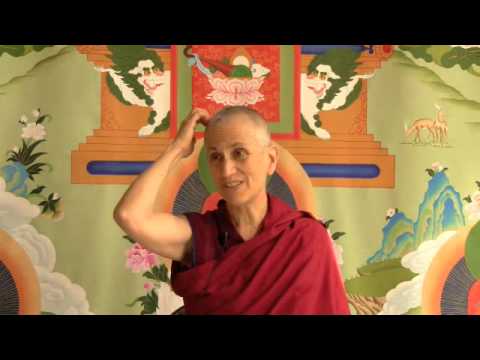Cleansing the mind of ignorance
Stages of the Path #113: Third Noble Truth
Part of a series of Bodhisattva's Breakfast Corner talks on the Stages of the Path (or lamrim) as described in the Guru Puja text by Panchen Lama I Lobsang Chokyi Gyaltsen.
- How the afflictions are temporary, they don’t have to be there
- What is sustaining the afflictions
- Wisdom can get rid of ignorance but cannot get rid of our good qualities
Yesterday we were talking a little bit about why the afflictions can be eliminated from the mind. One reason was because the nature of the mind is pure in that the afflictions aren’t always present. If the afflictions were the nature of the mind then they would always be there, then the mind would be impure.
Another reason why the afflictions can be eliminated is that they’re adventitious, meaning that they’re temporary, they don’t have to be there. They’re only there because there’s something sustaining them temporarily. What’s sustaining them is ignorance. The reason that they can be eliminated is because the object that ignorance apprehends (which is true existence) does not exist, and when we generate the wisdom that sees that true existence does not exist then ignorance can’t sit there and do its trip at the same time, because the wisdom is perceiving the opposite of what the ignorance perceives. Because wisdom is perceiving reality and ignorance is not wisdom can overpower the ignorance.
When wisdom overpowers the ignorance, when you’re in meditative equipoise on emptiness directly, then there’s no appearance of any true or inherent existence at all because the wisdom is overpowering it. As you meditate more and more, over and over, then you’re able to use that wisdom to cleanse the mind of both the seed of ignorance and the ignorance completely, as well as the predisposition or latency of ignorance. So all those things can be cleansed from the mind through the wisdom that sees things as they are. Whereas ignorance is perceiving them exactly the opposite way.
If things were truly existent then it would be impossible to eliminate the afflictions because then ignorance wouldn’t be ignorance—it would be wisdom, it would be apprehending things the way they are. And you can’t negate the way things are. But you can negate what ignorance is actually apprehending because what it’s apprehending doesn’t exist. So wisdom can overpower the ignorance and eliminate it completely.
But wisdom cannot get rid of our good qualities, our virtuous qualities, because our virtuous qualities aren’t based on ignorance. They can exist without ignorance. Whereas the afflictions (the attachment, the jealousy, the fear, and anxiety, and clinging, and craving, and all that stuff) that can’t exist without ignorance. But the good qualities can. So perceiving emptiness does not negate the good qualities at all, it only gets rid of the defilements.
Audience: Sometimes our virtues are based on ignorance, though, right?
Venerable Thubten Chodron (VTC): Well, sometimes in an ignorant mind a virtue can arise. Like we might have generosity but still perceive the agent, the action, and the object as truly existent, but that mind is having the appearance of true existence, but the generosity can still exist without that appearance of true existence.
Audience: I think we get in trouble because from the Western psychological point of view that kind of lumps all emotions as one, and so to discern that there’s one based on inaccurate perception….
VTC: That’s true, we tend to put all emotions in one category without discriminating that there are some that are based on a realistic perspective and some based on an unrealistic perspective. Yes. We have to discriminate that.
Venerable Thubten Chodron
Venerable Chodron emphasizes the practical application of Buddha’s teachings in our daily lives and is especially skilled at explaining them in ways easily understood and practiced by Westerners. She is well known for her warm, humorous, and lucid teachings. She was ordained as a Buddhist nun in 1977 by Kyabje Ling Rinpoche in Dharamsala, India, and in 1986 she received bhikshuni (full) ordination in Taiwan. Read her full bio.


